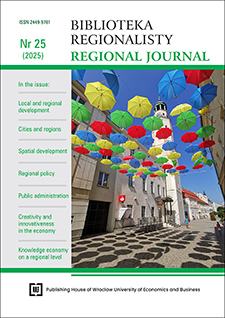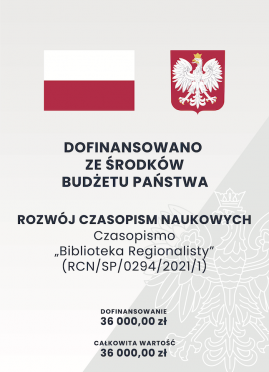Regional disparities in knowledge-intensive sectors. A comparative study of Poland and Czechia in the context of sustainable development
DOI:
https://doi.org/10.15611/br.2025.1.11Keywords:
knowledge-intensive services, high-technology manufacturing sectors, sustainable development, Poland, CzechiaAbstract
The study aimed to explore regional disparities in the employment of high-technology and knowledge-intensive sectors across Polish and Czech regions from 2019 to 2023 to identify which areas are thriving in innovation and economic growth and which are lagging, highlighting regional imbalances. The research applied a quantitative approach, utilising publicly available data from Eurostat to explore trends in employment in knowledge-intensive sectors and R&D personnel. The study also incorporated visual representations to illustrate regional trends and disparities. High-technology and knowledge-intensive sectors are critical for future economic resilience. Exploring disparities can reveal how prepared different regions are for economic shifts such as the transition to Industry 4.0 and the green economy. This research contributes to the existing literature by offering a comparative, longitudinal analysis of regional disparities in knowledge-intensive sectors in Poland and Czechia. It highlights the implications of these disparities for sustainable development and regional innovation policies, offering a unique perspective on the socio-economic dynamics within Central and Eastern Europe.
Downloads
References
Chojnicki, Z., & Czyż, T. (2006). Aspekty regionalne gospodarki opartej na wiedzy w Polsce. Poznań: Bogucki Wydawnictwo Naukowe.
Consoli, D., & Elche-Hortelano, D. (2010). Variety in the Knowledge Base of Knowledge Intensive Business Services. Res Policy, (39), 1303-1310.
Domenech, J., Escamilla, R., & Roig-Tierno, N. (2016). Explaining Knowledge-Intensive Activities from a Regional Perspective. Journal of Business Research, 69(4), 1301-1306.
Drucker, P. F. (1992). Innowacja i przedsiębiorczość. Praktyka i zasady. Państwowe Wydawnictwo Ekonomiczne.
Dziemianowicz, W., & Jałowiecki, B. (2004). Polityka miejska a inwestycje zagraniczne w polskich metropoliach. Wydawnictwo Naukowe Scholar.
Florida, R. (1995). Toward the learning region. Futures, 27(5), 527-536.
Florida, R. (2005a). Cities and the Creative Class. Routledge.
Florida, R. (2005b). The Flight of the Creative Class. The New Global Competition Form Talent. Harper Business.
Florida, R. (2008). Who’s Your City. How the Creative Economy is Making where to Live the Most Important Decision of Your Life. Basic Book.
Freel, M. (2006). Patterns of Technological Innovation in Knowledge-Intensive Business Services. Industry and Innovation, 13(3), 335-358.
GUS. (2023). Information society in Poland in 2023. Statistical analyses. Retrieved from https://stat.gov.pl/en/topics/science-and-technology/information-society
Kunhui, Y., Guo, L., & Yongwei, S. (2016). Networked or Un-Networked? A Preliminary Study on KIBS-Based Sustainable Urban Development: The Case of China. Sustainability, (8), 509.
Kwiatkowski, S. (2001). Bogactwo z wiedzy. In A. Kukliński (Ed.), Gospodarka oparta na wiedzy. Wyzwanie dla Polski XXI wieku. Komitet Badań Naukowych.
Levickaitė, R. (2015). Modelling of the Creative Economy Sustainable Development. Doctoral Dissertation Social Sciences, Economics (04S) Vilnius Gediminas Technical University.
Lundvall, B. A. (2004). Why is the New Economy a Learning Economy? Danish Research Unit for Industrial Dynamics Working Paper, 4(1).
Lundvall, B. A. (2006). Knowledge Management in the Learning Economy. Danish Research Unit for Industrial Dynamics Working Paper, 6(6). Retrieved from https://.druid.dk
Maskell, P., & Malmberg, A. (1999). Localised Learning and Industrial Competitiveness. Cambridge Journal of Economics, 23(2), 167-185.
Miszczak, K. (2011). Identifying Network Systems in Poland (Selected Issues). Studia Regionalia, (32), 73-86.
Miszczak, K. (2012a). Teoretyczne zagadnienia rozwoju gospodarki opartej na wiedzy i sektora ICT w aspekcie przestrzennym. Biblioteka Regionalisty, (12), 103-113.
Miszczak, K. (2012b). Dylematy rozwoju regionu ekonomicznego w świetle wyzwań XXI wieku. Wydawnictwo Uniwersytetu Ekonomicznego we Wrocławiu.
Miszczak, K. (2013). Rozwój sektora kreatywnego w regionach metropolitalnych Unii Europejskiej. In A. Klasik (Ed.), Rozwój gospodarki kreatywnej na obszarach metropolitalnych (pp. 9-22). Wydawnictwo Uniwersytetu Ekonomicznego w Katowicach.
Muller, E., & Doloreux, D. (2007). The Key Dimensions of Knowledge-Intensive Business Services (KIBS) Analysis: A Decade of Evolution. Arbeitspapiere Unternehmen und Region, (1), 1-26.
OECD. (2009). Employment in Knowledge-Oriented Sectors. In OECD Regions at a Glance 2009 (pp. 46-51). OECD Publishing. https://www.oecd.org/content/dam/oecd/en/publications/reports/2009/03/oecd-regions-at-a-glance-2009_g1gh9dee/reg_glance-2009-en.pdf
Rodrigues, M., & Franco, M. (2019). Measuring the Urban Sustainable Development in Cities Through a Composite Index: The Case of Portugal. Sustainable Development, 28(4), 507-520. https://doi.org/10.1002/sd.2005
Ronnie, J., Neto, J. V., Quelhasa, O. L. G., & de Matos Ferreira, J. J. (2017). Knowledge Intensive Business Services (KIBS): Bibliometric Analysis and Their Different Behaviors in the Scientific Literature: Topic 16 – Innovation and Services. RAI Revista de Administração e Inovação, (14), 216-225.
Sokół, A., & Mempel-Śnieżyk, A. (2022). Is Creative Capital a Function of Sustainable Development: Framework Development and Application. Journal of Cleaner Production, 337, 1-13. https://doi.org/10.1016/j.jclepro.2022.130526
Štreimikienė, D., & Kačerauskas, T. (2020). The Creative Economy and Sustainable Development: The Baltic States. Sustainable Development, 28(6), 1632-1641. https://doi.org/10.1002/sd.2111
Tchamyou, V. S. (2020). Education, Lifelong Learning, Inequality and Financial Access: Evidence from African Countries. Contemporary Social Science, 15(1), 7-25. https://doi.org/10.1080/21582041.2018.1433314
Wang, X., Xu, Z., Qin, Y., & Skare, M. (2022). Innovation, the Knowledge Economy, and Green Growth: Is Knowledge-Intensive Growth Really Environmentally Friendly? Energy Economics, 115, 106331. https://doi.org/10.1016/j.eneco.2022.106331
Zhang, X., Wang, G., & Bi, X. (2013). The Impact of Network Centrality and Knowledge Innovation Ability on the Innovation Performance of KIBS Enterprises. On Economic Problems, (8), 92-96.
Zieschank, R. (2004). Poland: Case Study Analysis of National Strategies for Sustainable Development. Retrieved December 14, 2024, from https://sdgtoolkit.org/wp-content/uploads/2017/03/Poland-Case-Study-Analysis-of-National-Strategies-for-Sustainable-Development-.pdf
Downloads
Published
Issue
Section
License
Copyright (c) 2025 Katarzyna Miszczak, Anna Mempel-Śnieżyk, Jaroslava Dědková

This work is licensed under a Creative Commons Attribution-ShareAlike 4.0 International License.
Accepted 2025-02-18
Published 2025-06-27








